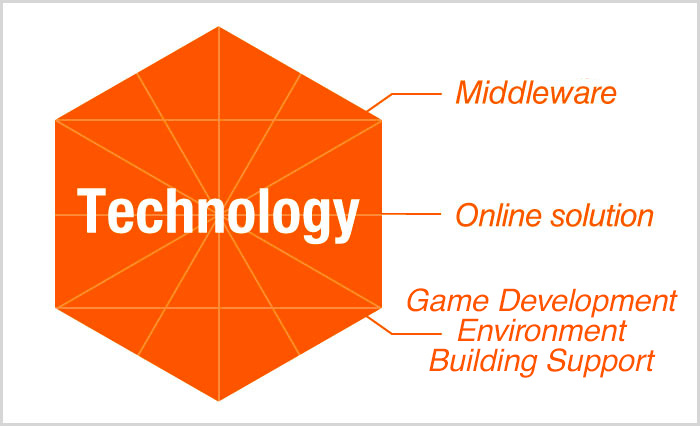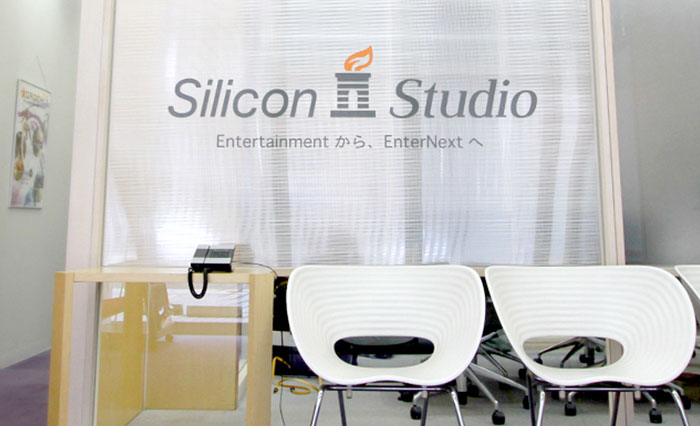Silicon Studio Corporation was established in November 1999 as an affiliate of SGI Japan, Ltd., the then local subsidiary of US-based Silicon Graphics Inc., to engage in a broad range of businesses related to real-time graphics (Note 1). Our corporate history after the establishment is shown below.
| Nov. 1999 | Established in Ebisu Nishi, Shibuya-ku, Tokyo, as an affiliate of SGI Japan, Ltd., the then local subsidiary of US-based Silicon Graphics Inc., to engage in a broad range of businesses related to real-time graphics (Note 1). |
|---|---|
| Jan. 2000 | Started operation with the personnel consisting of about 30 employees transferred from SGI Japan, Ltd. Started to operate a broad range of real-time graphics-related businesses. |
| Oct. 2000 | Concluded a business alliance agreement with Intrinsic Graphics Inc. (currently Vicarious Visions) regarding game software development middleware. Started development of Alchemy for PlayStation2. |
| Dec. 2001 | Acquired a license for the game software development middleware Alchemy from Intrinsic Graphics Inc., and started to offer its licenses to domestic companies. |
| Dec. 2003 | Started temporary staffing agency business for content creators. |
| Jul. 2004 | Started employment agency business for content creators. |
| Feb. 2007 | Released YEBIS, our original development middleware equipped with post-processing effect library (Note 2) functions to drastically enhance image quality. |
| Jan. 2008 | Established a game development division to start planning and development of original game content (started content business). |
| Feb. 2009 | Established Ignis Imageworks Corporation to develop 3D CG content (a 100% subsidiary with capital of 15 million yen). |
| Jan. 2010 | Started to provide consultation services on online entertainment servers; started a solution business in the field of development support and promotion. |
| Nov. 2010 | Started to offer Three Kingdoms Card Battle on the Mobage platform operated by DeNA Co., Ltd. |
| Feb. 2011 | Launched OROCHI, an all-in-one game engine (Note 3). |
| Feb. 2012 | Started to offer Fantasica as native smartphone app on the Mobage platform operated by DeNA Co., Ltd. |
| Mar. 2012 | Started to offer Muramasa: Princess Commander on the Mobage platform operated by DeNA Co., Ltd. |
| Aug. 2012 | Started to offer Fantasica, a worldwide version of the social game (Note 4) Fantasica in Counterattack, on the ngmoco platform operated by ngmoco, LLC. |
| Jun. 2013 | Started to offer Sumasaka, a card-based social game, jointly with GMO Internet Inc. on the Google Play platform operated by Google Inc. |
| Jul. 2013 | Started to offer Monster Takt as native smartphone app (Note 5) on the Google Play platform operated by Google Inc. |
| Jul. 2014 | Established Ad Technology division. |
| Jul. 2014 | Released Sengoku run in conjunction with YOMIURI TELECASTING CORPORATION on App Store by Apple Inc. and Google Play by Google Inc. |
| Aug. 2014 | Releases post effects middleware, YEBIS 3. |
| Sep. 2014 | Announced real-time rendering engine, Mizuchi. |
| Sep. 2014 | Released Age of Ishtaria on App Store by Apple Inc. and Google Play by Google Inc. |
| Feb. 2015 | Silicon Studio Corporation became listed on the Tokyo Stock Exchange Mothers. |
| Aug. 2015 | Released real-time rendering engine, Mizuchi. |
| May 2017 | Released real-time global illumination middleware, Enlighten. |
| Jul. 2018 | Transfered content business. |
| Nov. 2019 | the 20th anniversary |
Notes
- 1.Real-time graphics refer to the technologies for generating 3D images on computers at high speed. It is used to display motion video that allows real-time user interaction, such as games.
- 2.Post-processing effect library refers to programs that achieve post-processing effects using libraries. A post-processing effect is applied to a picture upon completion of the rendering processing. A library is a reusable package of a plurality of highly versatile programs.
- 3.All-in-one game engine refers to tools and libraries that provide a wide range of functions necessary for game development, including graphics, audio, physical simulation, and game logic. Game developers use game engines to improve development efficiency and introduce advanced technologies.
- 4.Social games refer to web applications that use online communities, such as social networking services (SNS), as the gaming platform and incorporate interaction among users into their functions.
- 5.Native smartphone app is a general term that refers to smartphone applications whose code is written such that the device CPU can directly process and execute it. These apps are distributed through the App Store run by Apple Inc. and Google Play run by Google Inc.
- *All names and trademarks mentioned are the registered trademarks and property of the respective companies.





